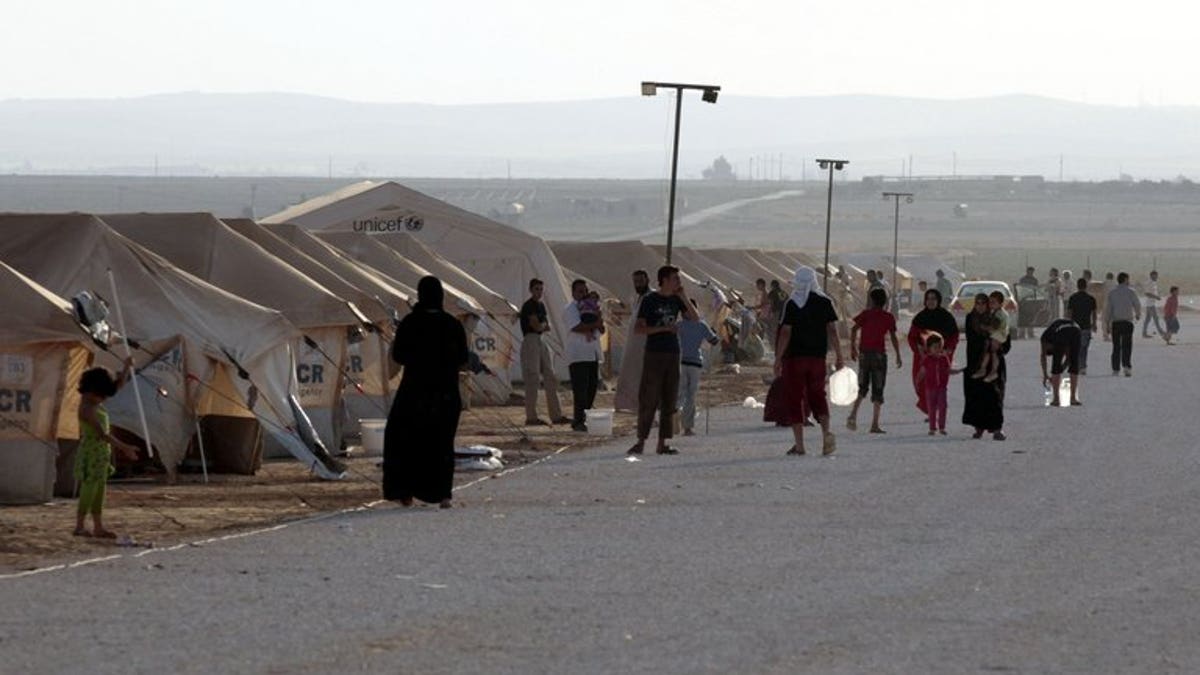
Syrian refugees gather at the Zaatari camp in Jordan, on July 31, 2012 (AFP/File)
Geneva (AFP) – Syria's neighbours pleaded Monday for more international support to deal with the huge influx of refugees from the war-ravaged country, warning the burden could destabilise the whole region.
"We are calling on the international community to bear its responsibility," Lebanon's Minister of Social Affairs Wael Abu Faour told diplomats gathered in Geneva, acknowledging "a certain bitterness" over the lack of assistance from outside the region.
He was speaking alongside the foreign ministers of Jordan, Turkey and Iraq at a special meeting of the UN refugee agency focused on how to better distribute the burden of the swelling Syria conflict, which since March 2011 has killed over 100,000 people and forced more than 2.1 million to flee into neighbouring countries.
"The impact of the refugee influx on the societies, economies and communities of the host countries is immense," warned UN High Commissioner for Refugees Antonio Guterres. He demanded that the global community help Syria's overstretched neighbours, which are already "going through huge demographic changes following the refugee influx, unsettling their social and economic fabric."
The countries in the region may need direct budget support, as well as long-term development investment, Guterres said, stressing also that countries outside the region needed to take in some of the refugees.
"I call on all countries, particularly in Europe and the extended Middle East, to allow Syrians to access asylum and enjoy quality protection," he said.
If the situation in Syria deteriorates drastically, he warned, "the international community may also have to consider the humanitarian emergency evacuation of Syrian refugees to locations outside the region to help ease the pressure on neighbouring countries."
EU Humanitarian Aid Commissioner Kristalina Georgieva, who also spoke at the conference, stressed the "very severe risk of destabilisation."
"We need to keep our borders open," she said.
Pressure on Syria's neighbours has already become unbearable, their representatives said Monday.
Lebanon for example, a country of just 4.4 million people, counts some 760,000 registered Syrian refugees, meaning as much as a quarter of its population is now Syrian.
This, Guterres pointed out, would be like Britain taking in 11 million refugees, or the United States welcoming 58 million.
While stressing Lebanon's commitment to helping Syrian refugees, Abu Faour warned that the "huge pressure" on his already fragile country's infrastructure, schools, health system and services was creating "antagonistic trends against Syrian refugees" and had provoked calls from some quarters to close the borders.
If the international community does not step up and do more, it risks "losing a major ally in Lebanon," he said.
Jordan meanwhile is now home to over 522,000 Syrian refugees, representing around 10 percent of the population, and the overflowing al-Zaatari camp that opened just 14 months ago has swelled to become the country's fourth largest city.
Jordanian Foreign Minister Nasser Judeh echoed the sentiment of fellow diplomats in urging donor countries to provide much-needed funds.
"The international community needs to replace words with deeds," Turkish Foreign Minister Ahmet Davutoglu said.
He said his country, which is now home to nearly 500,000 fleeing Syrians, had already spent $2.0 billion in direct support to the refugees -- less than 10 percent of which came from international assistance.
Participants in Monday's conference also pressed for a UN Security Council resolution focused on access for humanitarian workers to Syria.
"We need to do more to ensure our aid moves across battle lines and across borders and reaches the most conflict-affected areas and the most vulnerable populations," said US Deputy Secretary of State William Burns, whose country is the single largest donor to the Syria crisis, having contributed more than $1.0 billion.
"It is high time for the Security Council to speak with one voice to demand unfettered humanitarian access," he told the assembly.








































